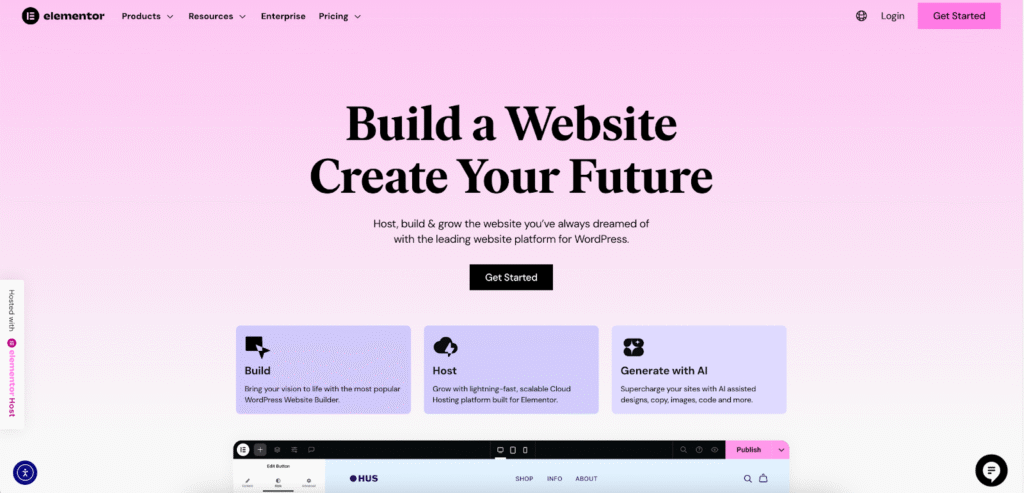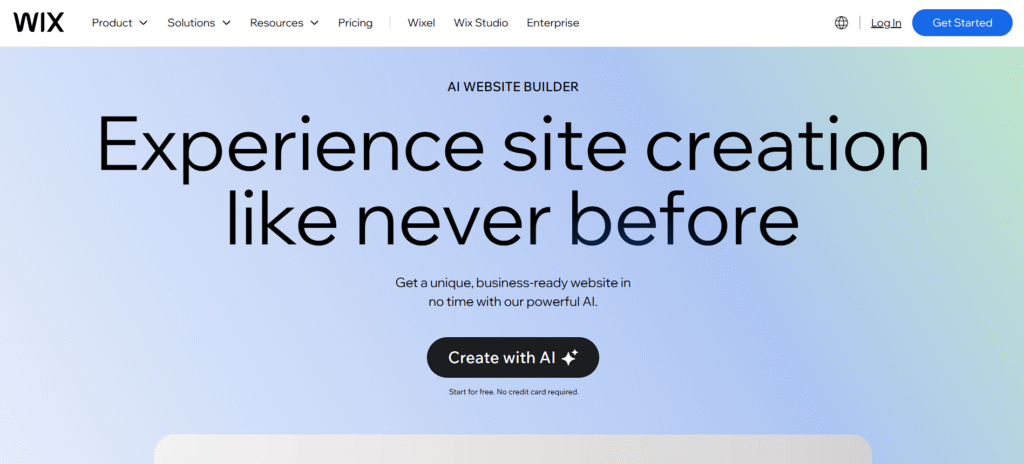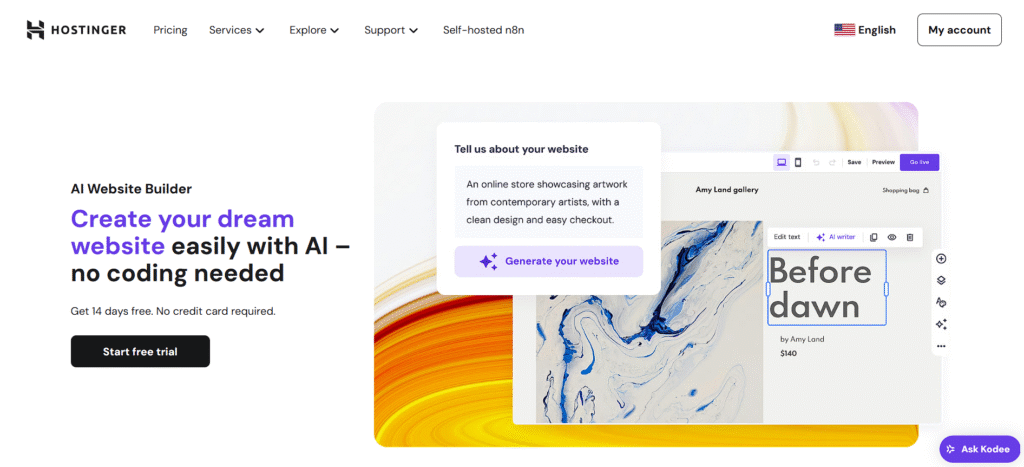Table of Contents
For a small business owner, time and resources are the most precious commodities. Traditional website development often demands a steep learning curve or a significant financial investment in hiring developers and designers. AI-powered platforms change this equation entirely. They leverage sophisticated algorithms to automate design choices, generate content, optimize for performance, and even assist with marketing strategies. This allows business owners to focus on what they do best: running their business. This guide will explore the best AI website builders available today, providing an in-depth analysis to help you select the perfect tool to build and grow your online presence.
Key Takeaways
- AI Simplifies Web Creation: AI website builders automate the most challenging aspects of web design, including layout creation, content generation, and image selection, making it possible for anyone to build a professional website.
- Elementor Leads with an Integrated AI Ecosystem: Elementor AI stands out by deeply integrating its AI capabilities within a comprehensive platform. This includes tools for planning, content creation, image generation, and custom code, all within its renowned drag-and-drop editor.
- Choosing the Right Builder Depends on Your Needs: The best AI website builder is subjective and depends on specific business requirements. Factors to consider include ease of use, design flexibility, scalability, built-in marketing tools, and pricing.
- Beyond the Build: AI Assists in Growth: Modern AI tools do more than just build your site. They help with SEO optimization, content marketing, and even email campaign creation, becoming a true partner in your business’s growth.
- The Future is Agentic: The next wave of AI, seen in tools like Elementor’s Angie, will move from assisting to acting. Agentic AI will perform complex, multi-step tasks on command, further revolutionizing workflow automation for website management.
The Evolution from Manual Coding to Intelligent Automation
To appreciate the revolution AI brings, it’s helpful to look back at how websites were built. The journey began with manual coding in HTML and CSS, a process accessible only to those with technical expertise. Then came Content Management Systems (CMS) like WordPress, which simplified content management but still required significant setup, theme selection, and plugin configuration.
The next major leap was the visual, drag-and-drop page builder. Platforms like Elementor transformed the WordPress experience, offering a live, front-end editing environment where users could see their changes in real-time. This “what you see is what you get” (WYSIWYG) approach was a game-changer, but the creative process still rested entirely on the user’s shoulders. You had the tools, but you still needed the vision and the time to execute it.
AI represents the latest and most significant evolution. It builds upon the visual builder foundation by adding a layer of intelligence. Instead of providing a blank canvas and a toolbox, an AI website builder asks for your goals and helps you achieve them. It acts as your personal designer, copywriter, and strategist, accelerating the workflow from days or weeks to mere minutes.
What Makes a Great AI Website Builder?
Not all AI website builders are created equal. As this technology matures, certain features and capabilities have emerged as hallmarks of a top-tier platform. When evaluating your options, consider the following criteria:
- Ease of Use and an Intuitive Onboarding Process: The primary promise of an AI builder is simplicity. The best platforms guide you through a conversational setup process, asking about your business type, goals, and style preferences.
- Intelligent Design and Layout Generation: A superior AI builder doesn’t just populate a template. It generates multiple unique, professional layouts tailored to your industry and stated needs, allowing you to choose a starting point that truly fits your brand.
- Powerful Content Generation and Editing Tools: “Writer’s block” is a common hurdle. Leading AI builders feature integrated tools to generate headlines, body text, and calls-to-action. They should also offer options to refine this content by changing its tone, translating it, or simplifying it.
- Seamless Image Creation and Integration: Finding the right visuals can be time-consuming and expensive. The ability to generate unique, high-quality images from a text prompt, or enhance existing ones directly within the builder, is a massive advantage.
- Customization and Creative Freedom: While AI provides a massive head start, you should never be locked into its initial suggestions. A great AI builder allows you to take the generated design and fully customize it using a flexible drag-and-drop editor. You need the ability to tweak every element, from colors and fonts to layout and spacing.
- Integrated Ecosystem of Tools: A website is more than just pages. It’s a business hub. The best platforms integrate the AI builder with a suite of essential tools for SEO, marketing, eCommerce, and performance optimization. This creates a unified, efficient workflow.
A Deep Dive into the Best AI Website Builders for Small Businesses
We’ve analyzed the market to identify the platforms that deliver the most powerful, integrated, and user-friendly AI experiences for small business owners.
1. Elementor: The Complete AI-Powered Web Creation Platform

Elementor has evolved far beyond its origins as a page builder. It now stands as a comprehensive web creation platform, and its AI implementation is a testament to this strategic shift. Rather than offering a standalone, limited AI tool, Elementor has deeply woven AI capabilities throughout its entire ecosystem, creating a seamless and powerful workflow that covers every stage of the website creation process.
At the heart of its offering is Elementor AI, a suite of intelligent tools integrated directly into the world-renowned Elementor editor. This contextual integration is its greatest strength. The AI is aware of what you’re working on—a heading, an image, a block of text—and provides relevant assistance without you ever needing to leave the page. This eliminates the disjointed experience of using separate AI tools for content and images and then importing them into your builder.
Key AI Features of Elementor:
- AI Site Planner: Before you even start designing, the AI Site Planner acts as a strategic partner. Through a simple chat interface, you describe your business, and it generates a complete professional website brief, a logical sitemap, and even interactive, stylized wireframes. This free tool is revolutionary for freelancers and small businesses, condensing hours of planning into minutes and providing a solid, strategic foundation for your project.
- Integrated Content and Image Generation: Directly within the editor, you can generate compelling text for any element. Need a powerful headline for your hero section? A descriptive paragraph for your services? Elementor AI can draft it for you. You can then refine it, change the tone from professional to casual, or even translate it into different languages. The same goes for images. Describe the visual you need, and the AI will generate it on the spot. You can then use AI to edit it, extend its background, or create variations.
- AI Code Assistant: For those who want to push the boundaries of design without being a developer, the AI Code Assistant is a game-changer. You can ask it to generate custom CSS to create unique hover effects, animations, or styles. This makes advanced customization accessible to everyone, bridging the gap between no-code simplicity and developer-level control.
- Agentic AI with Angie: Looking ahead, Elementor is pushing the boundaries with Angie, its agentic AI assistant. Unlike generative AI that just creates content, agentic AI acts. You can give Angie a command like “Create a landing page for my new spring sale,” and it will perform the multi-step task of creating the page, adding relevant products, and applying a promotional banner. This represents the future of workflow automation.
Pros:
- Unmatched Integration: AI tools are available everywhere you need them within the editor, creating the smoothest workflow on the market.
- Comprehensive Ecosystem: The AI is part of a larger platform that includes managed WordPress hosting, an Image Optimizer, a Site Mailer for reliable emails, and accessibility tools. This creates a true all-in-one solution.
- Total Creative Control: The AI gives you an incredible starting point, but you always have the final say. You can use Elementor’s powerful editor to customize every single detail, ensuring your site is unique.
- Built on WordPress: It leverages the power and flexibility of the world’s most popular CMS, giving you access to a vast ecosystem of plugins and unlimited scalability.
Cons:
- Learning Curve for Advanced Features: While the basics are intuitive, mastering the full suite of Elementor Pro’s professional tools can take some time.
- Requires Hosting: Unlike closed SaaS platforms, you need a hosting plan. However, Elementor’s own hosting solution is optimized for performance and bundles Elementor Pro.
Pricing:
Elementor AI operates on a credit-based system, with a generous free trial to get you started. The core Elementor builder plugin is free. To unlock the full potential, you’ll need an Elementor Pro plan (starting at $59/year) and a hosting plan. Elementor Hosting plans, which include the Pro builder, start at a very competitive price point.
Who is it for?
Elementor is the ideal choice for small business owners, designers, and freelancers who want the best of both worlds: the speed and intelligence of AI combined with the unparalleled creative freedom and scalability of a professional-grade builder. It’s for those who want a platform that can grow with their business, from a simple brochure site to a complex eCommerce store.
2. Wix ADI (Artificial Design Intelligence)

Wix has long been a leader in the user-friendly website builder space, and its Wix ADI offering is a strong contender in the AI arena. It’s designed for absolute beginners who want to get online as quickly as possible with minimal fuss. The process is straightforward: you answer a series of questions about your business and style preferences, and Wix ADI generates a complete website for you in minutes.
Key AI Features of Wix ADI:
- Guided Setup: The onboarding process is highly conversational and easy to follow. It feels less like using a tool and more like having a consultation.
- Full Website Generation: Wix ADI doesn’t just create a homepage. It builds a multi-page site with relevant sections, pre-filled with text and images sourced from a vast library.
- Smart Content Curation: The AI pulls in business information from around the web if available and selects professional stock images that match your industry.
Pros:
- Extremely Easy to Use: It’s arguably the simplest and fastest way to get a functional website live.
- All-in-One Platform: Wix is a hosted solution, meaning your hosting, security, and technical maintenance are all handled for you.
- Seamless Switch to Editor: If you feel limited by the ADI, you can switch your site over to the standard Wix Editor for more granular control.
Cons:
- Limited Design Flexibility: The layouts generated by the ADI, while professional, can feel a bit generic. Customization options are more restricted compared to a full-featured builder.
- Switching is One-Way: Once you move from Wix ADI to the standard editor, you cannot go back.
- Proprietary Platform: You are locked into the Wix ecosystem. You cannot migrate your site to another hosting provider.
Pricing:
Wix offers a free, ad-supported plan. To connect a custom domain and remove ads, you’ll need one of their premium plans, which range from personal to business tiers.
Who is it for?
Wix ADI is perfect for small business owners, sole proprietors, or individuals who prioritize speed and simplicity above all else. If your primary goal is to get a clean, professional “digital business card” online with zero technical hassle, it’s an excellent choice.
3. Hostinger AI Website Builder (formerly Zyro)

Hostinger’s AI Website Builder is another strong all-in-one solution that bundles an intuitive builder with its well-regarded hosting services. It’s designed to be a direct competitor to platforms like Wix and Squarespace, offering a streamlined, code-free experience with a suite of AI tools to accelerate the process.
Key AI Features of Hostinger AI Builder:
- AI Website Generator: Similar to Wix ADI, you start by providing details about your brand and the type of website you need. The AI then generates a personalized template as a starting point.
- AI Writer: This tool is integrated into the builder to help you generate SEO-friendly content for your pages.
- AI Heatmap: A standout feature that helps you understand user behavior. It predicts where visitors will focus their attention on your pages, allowing you to optimize your layouts for conversions.
- AI Logo Maker: A handy tool for new businesses that need to create a simple, professional logo quickly.
Pros:
- Affordable All-in-One Plans: Hostinger is known for its competitive pricing, and its builder plans are no exception, often including a free domain name for the first year.
- User-Friendly Interface: The builder uses a grid-based system that makes it easy to align elements and create clean, structured layouts.
- Useful AI Marketing Tools: The Heatmap and Writer tools provide tangible value beyond just the initial site build.
Cons:
- Less Design Freedom than Elementor: While customizable, it doesn’t offer the same level of granular control or the vast widget library found in Elementor.
- eCommerce is Basic: The eCommerce functionality is suitable for small stores but may not scale as well as solutions like Elementor’s WooCommerce Builder.
- Platform Lock-In: Like other SaaS builders, you cannot move your site to another host.
Pricing:
Hostinger offers a single, affordable plan for its website builder that includes hosting, the builder, and all the AI tools.
Who is it for?
The Hostinger AI Builder is a great option for small businesses on a tight budget who want a simple, all-inclusive package. The combination of an easy-to-use builder, helpful AI marketing tools, and affordable hosting makes it a strong value proposition.
4. Jimdo

Jimdo is a website builder that focuses on the specific needs of self-employed individuals and very small businesses. Its AI-powered solution, called Jimdo Dolphin, is designed to create a website for you in just three minutes. The process is highly automated and aims to get you from zero to a published site with astonishing speed.
Key AI Features of Jimdo Dolphin:
- Hyper-Fast Onboarding: The question-and-answer process is quick and to the point.
- Automated Industry-Specific Design: Jimdo excels at creating sites that are tailored to specific industries, like restaurants, consultants, or local shops, complete with relevant pre-built sections.
- Automatic SEO: The builder takes care of basic SEO settings for you during the setup process.
Pros:
- Incredibly Fast: If your goal is speed, Jimdo Dolphin is hard to beat.
- Mobile-Optimized: All designs are fully responsive and look great on mobile devices.
- Legally Compliant Text: For users in Europe, Jimdo can automatically generate GDPR-compliant legal texts like privacy policies.
Cons:
- Very Limited Customization: The trade-off for speed is a significant lack of creative control. Your ability to modify the AI-generated design is quite restricted.
- Basic Features: The feature set is focused on the essentials. You won’t find advanced marketing or design capabilities.
- May Be Too Simplistic for Growth: Businesses that anticipate needing more advanced features in the future may find the platform limiting.
Pricing:
Jimdo offers several tiered plans, including a free option and affordable paid plans that add features like a custom domain and eCommerce functionality.
Who is it for?
Jimdo Dolphin is for the true beginner or the micro-business owner who needs a simple, professional, and legally sound online presence right now. It’s for those who see a website as a necessity to be checked off the list, rather than a deep creative project.
Feature Comparison Table
| Feature | Elementor AI | Wix ADI | Hostinger AI Builder | Jimdo Dolphin |
| Platform Type | WordPress Plugin | Hosted SaaS | Hosted SaaS | Hosted SaaS |
| Core AI Feature | Integrated Workflow | Full Site Generation | Full Site Generation | 3-Minute Site Creation |
| Design Customization | Excellent | Fair | Good | Limited |
| AI Content Writer | Yes (Advanced) | Yes (Basic) | Yes (SEO-focused) | No |
| AI Image Generator | Yes | No | No | No |
| eCommerce | Excellent (via WooCommerce) | Good | Good | Basic |
| Hosting Included | No (Elementor Hosting available) | Yes | Yes | Yes |
| Portability | Yes (WordPress) | No | No | No |
| Best For | Growth & Flexibility | Speed & Simplicity | Budget-Conscious Users | Absolute Beginners |
How to Choose the Right AI Website Builder for Your Business
Selecting the right tool is a strategic decision. Website development expert Itamar Haim advises, “Don’t just look at the features list. Think about where your business will be in two or three years. The best platform is one that not only solves your immediate needs but also provides a clear path for growth without forcing you to migrate later.”
Here’s a step-by-step guide to making your choice:
- Define Your Core Needs: Are you an eCommerce business that needs robust product pages and payment gateways? Are you a consultant who needs a powerful booking system? Make a list of your “must-have” features.
- Assess Your Technical Comfort Level: Be honest about your skills. If the idea of dealing with hosting is intimidating, a hosted SaaS solution like Wix or Hostinger might be appealing. If you value control and want the power of the WordPress ecosystem, a platform like Elementor is the superior choice.
- Consider Your Design Vision: Do you have a strong brand identity and a specific vision for your site’s look and feel? If so, you’ll need a builder with high levels of customization like Elementor. If a clean, professional template is sufficient, other options will work.
- Evaluate Long-Term Scalability: Think about the future. Will you want to add a blog, a forum, or advanced membership features down the line? A platform built on an open-source CMS like WordPress offers virtually limitless potential for expansion, while closed platforms can be more restrictive.
- Test Drive the Free Trials: Most of these platforms offer free plans or trials. Spend some time with them. See which interface feels most intuitive to you. The experience of using the tool is just as important as the features it offers.
Conclusion: Embracing AI as Your Creative Partner
The advent of AI website builders marks a pivotal moment for small businesses. The barriers to entry for creating a beautiful, professional, and effective online presence have been completely dismantled. These intelligent tools are no longer just assistants; they are creative partners that accelerate workflows, spark ideas, and handle the heavy lifting of design and content creation.
For the small business owner who wears many hats, this is a profound advantage. It frees up invaluable time and mental energy, allowing you to invest in strategy, customer relationships, and business growth. Whether you opt for the all-in-one simplicity of a hosted solution or the unmatched power and flexibility of a platform like Elementor AI, you are empowering your business with technology that was once the exclusive domain of large corporations and expert developers. The future of web creation is here, and it’s smarter, faster, and more accessible than ever before.
Frequently Asked Questions (FAQ)
1. Can an AI-built website truly be unique? Yes. While AI generates the initial design based on patterns and best practices, leading platforms like Elementor provide complete customization control. You can change every color, font, image, and layout element to ensure the final product perfectly reflects your unique brand identity. The AI provides the starting point, not the finished product.
2. Do I need to know how to code to use an AI website builder? Absolutely not. The primary purpose of these tools is to provide a completely code-free experience. All design and editing are done through a visual, drag-and-drop interface. Tools like Elementor’s AI Code Assistant can even help you generate custom code snippets without you needing to write them yourself.
3. How does AI help with Search Engine Optimization (SEO)? AI assists with SEO in several ways. Many builders automatically implement technical SEO best practices, like responsive design and clean code structures. AI content writers can help generate keyword-rich text. Furthermore, the speed at which you can build and update your site allows you to keep your content fresh, which is a positive signal for search engines.
4. Can I build an online store with an AI website builder? Yes, most top-tier AI website builders offer robust eCommerce capabilities. Platforms built on WordPress, like Elementor, integrate seamlessly with WooCommerce, the world’s most popular eCommerce platform, allowing you to build highly customized and scalable online stores. Hosted solutions like Wix and Hostinger also have their own built-in eCommerce tools.
5. What is the main difference between a traditional website builder and an AI website builder? A traditional builder provides you with a set of tools and templates (a blank canvas), but all the creative and strategic decisions are up to you. An AI website builder acts as an intelligent assistant in that process. It asks about your goals and generates a customized starting point, including design, text, and images, dramatically speeding up the initial creation phase.
6. Will AI take over the jobs of web designers? Most experts believe AI will augment, not replace, web designers. AI is incredibly effective at handling repetitive and time-consuming tasks, which frees up human designers to focus on higher-level strategy, unique user experience (UX) challenges, and client relationships. Designers who leverage AI tools will be able to produce better work more efficiently.
7. Is it expensive to use an AI website builder? No, in fact, it’s often more cost-effective than traditional methods. Many platforms offer free plans or very affordable entry-level pricing. When you consider the savings from not having to hire a professional designer or developer, the value proposition is extremely strong for small businesses.
8. What happens if I want to move my website to another platform later? This is a critical consideration. If you use a hosted SaaS platform (like Wix, Hostinger, Jimdo), you are locked into their system and cannot move your site. If you use a solution built on WordPress, like Elementor, you have complete ownership and control. You can migrate your website to any hosting provider at any time, offering much greater long-term flexibility.
9. How much content does the AI actually write for me? The AI can generate as much or as little content as you need. It can draft entire paragraphs, suggest headlines, or simply help you refine a sentence you’ve already written. The best practice is to use the AI-generated text as a strong first draft and then edit and personalize it to match your brand’s specific voice and message.
10. Are there free AI website builders? Yes, many of the platforms discussed, including Elementor (with its core free plugin), Wix, and Jimdo, offer free plans. These plans are a great way to test the platform’s capabilities. Typically, they come with limitations, such as using a branded subdomain and displaying ads. To connect a professional custom domain and unlock all features, you will need to upgrade to a paid plan.
Looking for fresh content?
By entering your email, you agree to receive Elementor emails, including marketing emails,
and agree to our Terms & Conditions and Privacy Policy.






